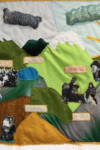Call for submissions: Postcolonial Cities in Dis(-)appearance, a special issue of Full Stop Quarterly, guest-edited by Michelle Chan Schmidt
In this special issue of the Full Stop Quarterly, on “Postcolonial Cities in Dis(-)appearance,” I want to center marginalized experiences of the postcolonial city in contemporary literature and criticism. I’m interested in how the forces of art depict the historical, social, political, and environmental forces at work in “dis(-)appearing” (as a transitive verb) postcolonial cities.
The parenthesized hyphen in “dis(-)appearance” potentiates its dual meaning as a harbinger of tangible destruction (“disappearance”) and/or psychic misrecognition (“dis-appearance”), in the wake or continued presence of the ultimate dis(-)appearing force: empire. I’d love to read your takes on the literatures of dis(-)appearing, non-Western-Eurocentric and non-Americentric postcolonial cities. While clunkily phrased, this marginocentrism will project our critical energies onto historically stereotyped, maligned, and/or under-imagined urban spaces.
I’m looking for essays that contrast socio-political critique with literary criticism to investigate literature’s modes of understanding the dis(-)appearing city. I also want to highlight representations of cities suffering from war and oppression. To further the dialectics of contemporary translation theory, I’d welcome discussions of texts as yet untranslated into English, particularly from non-imperial indigenous languages; and I’d love to learn about works that formally experiment with urban mimesis, published with independent or lesser-known presses. Above all, this issue aims to splice current literary criticism with materialist and historicist thought, on the vital cultural site of the dis(-)appearing postcolonial city.
Some works that could resonate with this issue are Owlish by Dorothy Tse (trans. Natascha Bruce; pub. 2023), in which character and subterfuge subsume the urban fabric of Hong Kong’s fictionalization; Mesopotamia by Serhiy Zhadan (trans. Reilly Costigan-Humes, Wanda Phipps, Virlana Tkacz & Isaac Stackhouse Wheeler; pub. 2018), identifying Kharkiv with the heritage and wealth of Mesopotamia after Russia’s 2014 invasion; and Palestine +100: Stories from a century after the Nakba (ed. Basma Ghalayini; pub. 2019), anthologizing visions of a still-imaginable future.
I hope these questions might illuminate your approach to the postcolonial city:
What are the commonalities or differences of writing urban dis(-)appearance across continents, or in the same city across disparate works of literature?
How does literature counter brutality? Does an ideal utopian city exist across the trenches of global writing?
How does the act of translation, as a double layer of creation, respond to the language of dis(-)appearance?
How does the diaspora write to remember?
Do cinematic representations of the dis(-)appearing postcolonial city complement or counter literary representations?
To Submit:
I’d like to ensure geographical, ethnic, and gender diversity across the issue’s final contributors, and welcome submissions from unpublished writers, as well as writers working in marginalized regions.
Essays should be between 2,000 and 5,000 words, and deal with at least one text or body of literature. This special issue is also open to interviews, oral discussions, and other discursive forms; it unfortunately has no space for creative nonfiction, poetry, or fiction. All submissions should be previously unpublished. Should your work be accepted, we’re happy to offer payment ranging from $50 to $125.
While completed, full-length drafts are welcome, I would love to hear from you with a pitch that clearly identifies your contribution’s literary focus, its questions, and how it relates to the topic at hand. If you feel unsure, please don’t hesitate to get in touch so we can discuss your idea! I hope the submission and writing process will feel accessible to all.
Please email your draft, pitch, or idea, alongside a third-person bio no more than 100 words, to [email protected] before April 15, 2024. I look forward to working with you!
This post may contain affiliate links.







